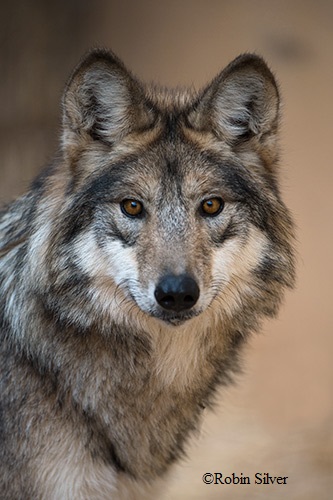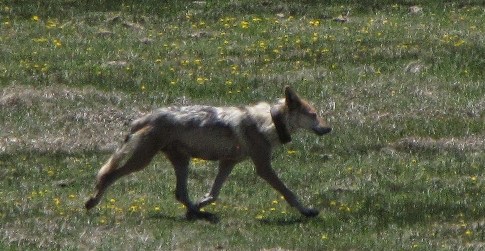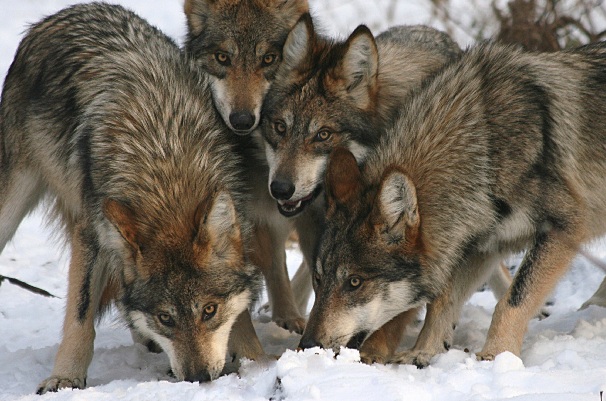10
Jul
Mexican Wolf Reintroduction Project News

Endangered Species Updates
July 8, 2016
Mexican Wolf Reintroduction Project Monthly Update
June 1-30, 2016
The following is a summary of Mexican Wolf Reintroduction Project (Project) activities in the Mexican Wolf Experimental Population Area (MWEPA) in Arizona, including the Fort Apache Indian Reservation (FAIR), San Carlos Apache Reservation (SCAR), and New Mexico. Additional Project information can be obtained by calling (928) 339-4329 or toll free at (888) 459-9653, or by visiting the Arizona Game and Fish Department website at www.azgfd.gov/wolf or by visiting the U.S. Fish and Wildlife Service website at www.fws.gov/southwest/es/mexicanwolf. Past updates may be viewed on either website, or interested parties may sign up to receive this update electronically by visiting www.azgfd.gov/signup. This update is a public document and information in it can be used for any purpose. The Project is a multi-agency cooperative effort among the Arizona Game and Fish Department (AGFD), USDA Forest Service (USFS), USDA-Animal and Plant Health Inspection Service, Wildlife Services (USDA-APHIS WS), U.S. Fish and Wildlife Service (USFWS) and the White Mountain Apache Tribe (WMAT).
To view semi-monthly wolf telemetry flight location information please visit Recent Wolf Locations (ArcGIS)
Please report any wolf sightings or suspected livestock depredations to: (928) 339-4329 or toll free at (888) 459-9653. To report incidents of take or harassment of wolves, please call the AGFD 24-hour dispatch (Operation Game Thief) at (800) 352-0700.
Overall Mexican Wolf Recovery Program Monthly Update
On June 2, the public information specialists from the U.S. Fish and Wildlife Service, the U.S. Forest Service, Arizona Game and Fish Department, White Mountain Apache Tribe, and Eastern Arizona Counties met with biologists from these agencies to discuss ways that the Mexican Wolf Recovery Program can improve outreach and communication to communities and interested parties in Arizona and New Mexico.
The Forest Service convened a meeting/conference call on June 16 with the Farm Services Agency (FSA), U.S. Fish and Wildlife Service, and Arizona Game and Fish Department to seek clarification on the implementation of the FSA Livestock Indemnity Program, which provides funding to livestock producers for wolf depredations.
On June 29, the Fish and Wildlife Service announced the request for proposals for the 2016 Livestock Demonstration grants, which are grants to states and tribes that are competitive at a national level. In the Southwest, these grants have been awarded in the past to the Arizona Game and Fish Department, New Mexico Department of Agriculture, and the White Mountain Apache Tribe.
Numbering System: Mexican wolves are given an identification number recorded in an official studbook that tracks their history. Capital letters (M = Male, F = Female) preceding the number indicate adult animals 24 months or older. Lower case letters (m = male, f = female) indicate wolves younger than 24 months or pups. The capital letter “A” preceding the letter and number indicate breeding wolves.
Our note: You will notice that some of the wolves also have names associated with their identification numbers. For the last two years we had a Pup Naming Contest for Kids to name the pups born in Spring. The names that you see are the winning names that we have assigned to the pups. Follow these links for all the entries and results from the 2012 contest, 2013 contest, 2014 contest, and 2015 contest.
Definitions: A “wolf pack” is defined as two or more wolves that maintain an established territory. In the event that one of the two alpha (dominant) wolves dies, the remaining alpha wolf, regardless of pack size, retains the pack status. The packs referenced in this update contain at least one wolf with a radio telemetry collar attached to it. The Interagency Field Team (IFT) recognizes that wolves without radio telemetry collars may also form packs. If the IFT confirms that wolves are associating with each other and are resident within the same home range, they will be referenced as a pack.
CURRENT POPULATION STATUS
At the end of June 2016, the wild Mexican wolf population consisted of 47 wolves with functional radio collars in 19 packs and 5 single wolves.

IN ARIZONA:
Bear Wallow Pack (collared Poco-M1338 and Bailey-F1335)
In June the Bear Wallow Pack was located within their traditional territory in the east-central portion of the Apache-Sitgreaves National Forest (ASNF). During this month, the Bear Wallow pack has re-localized and is once again showing denning behavior, suggesting that the den may not have been lost.
Bluestem Pack (collared Fuerza-M1382, F1443, Faith-f1488, and Isra-f1489)
In June, the Bluestem Pack continued to use their traditional territory in the central portion of the ASNF. Wolves F1443, Isra-f1488 and Faith-f1489 have been consistently located together near the Bluestem den. Two pups have been confirmed for Bluestem pack this year. Fuerza-M1382 continues to travel throughout Arizona and New Mexico.
Buckalou Pack (collared M1404 and F1405)
M1404 and F1405 continue to travel together between Arizona and New Mexico in both the Gila and Apache National Forests.
Elk Horn Pack (collared AF1294 and M1342)
In June, the IFT continued to document denning behavior by this pack this month. The Elk Horn Pack has periodically used a food cache set up by the IFT to supplement the pack due to the two pups cross-fostered into the pack’s litter in April.
Hawks Nest Pack (collared AM1038, Apache-M1383, and Bosque-m1453)
In June, the Hawks Nest Pack was located within their traditional territory in the north central portion of the ASNF.
Hoodoo Pack (collared Copper-M1290, Verde-F1333, and Kiko-m1441)
In June, the Hoodoo Pack remained in the north-central portion of the ASNF. The IFT continued to document denning behavior by the Hoodoo Pack this month. The Hoodoo Pack has continued to utilize the food cache put in place for them to prevent potential depredation issues in the area.
Marble Pack (collared Shadow-AM1330 and Auiu-m1440)
In June, the Marble Pack consisted of two collared wolves: Shadow-AM1330 and Auiu-m1440. Shadow-AM1330 has traveled within the northwestern portion of the ASNF during the month of June, has remained somewhat localized, and has been documented traveling alone. Wolf Auiu-m1440 was found dead in New Mexico this month. The incident is under investigation.
Maverick Pack (collared AM1183 and Sandy-AF1291)
In June, the Maverick Pack was located within their traditional territory both on the FAIR and ASNF. The Maverick Pack has localized and is showing signs of denning.
Panther Creek Pack (Esperanza-F1339 and M1394)
In June, the Panther Creek Pack has been located in the east-central portion of the ASNF. This pack continues to show denning behavior and to utilize the food cache that the IFT has maintained for them.
ON THE FAIR:
Diamond Pack (collared M1249, f1437, Mago-mp1447, and Suki-mp1454)
In June, the Diamond Pack was located in the eastern portion of the FAIR, the northwest portion of the ASNF, and non-public land in Arizona. Following a period of not being heard, F1437 was heard in the northwest portion of the ASNF. It is not yet known if this pack denned.
Tsay o Ah Pack (collared AM1343, Ma’iitosoh-AF1283, and Libre-fp1445)
In June, the Tsay-o-Ah Pack was located in the eastern portion of the FAIR. Libre-f1445 traveled to the northwestern portion of the ASNF.

IN NEW MEXICO:
Dark Canyon Pack (collared AM992 and Stella-f1444)
During June, the IFT located this pack within its traditional territory in the west-central portion of the Gila National Forest (GNF). During June, Stella-f1444 returned to its traditional territory.
Iron Creek Pack (collared AM1240 and Acalia-AF1278)
During June, the Iron Creek Pack continued to utilize their territory in the northern portion of the Gila Wilderness and the southern portion of the GNF. A diversionary food cache is being maintained for the Iron Creek Pack to mitigate potential wolf-livestock conflicts.
Luna Pack (collared AF1115, AM1158, and AF-1487)
During June, the Luna Pack remained in their traditional territory in the north-central portion of the GNF. The IFT is maintaining a diversionary and supplemental food cache in efforts to reduce potential for further livestock depredations and assist other pack members feed pups following the removal of Guardian-M1396.
Mangas Pack (collared AM1296 and Wuna-F1439)
During June, the Mangas Pack was located within their territory in north-western portions of the GNF in New Mexico.
Prieto Pack (collared AF1251, AM1387, Monty-M1386, Tsuki-m1455, and f1456)
During June, the Prieto Pack was located within their traditional territory in the north-central portion of the GNF. In June, the IFT documented a minimum of four pups produced with the Prieto pack. A diversionary food cache is being maintained for the Prieto Pack to reduce potential wolf-livestock conflicts.
San Mateo Pack (collared M1345 and Survivor-F1399)
During June, the IFT documented M1345 and Survivor-F1399 traveling together within their territory in the north-central portion of the GNF. In June, Survivor-AF1399 was captured and recollared, it was determined that Survivor-AF1399 was lactating confirming reproduction. The IFT has continued to document denning behavior by this pack. A diversionary food cache is being maintained for the San Mateo Pack to reduce potential wolf-livestock conflicts.
SBP Pack (collared Krypto-M1284 and Tempesta-F1392)
In June the SBP Pack continued to use their traditional territory in the north-central portion of the GNF. The supplemental food cache was discontinued following abandonment of use by the SBP Pack. In June, the IFT began predation-study on the SBP pack to assess native ungulate kill-rates. Data collected during predation study suggests the survival of at least one pup.
Willow Springs Pack (collared Vida-F1397)
In June, the IFT documented the Willow Springs Pack within their traditional territory in the north central portion of the GNF.
Single Adero-M1398
During June, Adero-M1398 continued to make movements in Arizona and New Mexico.
Single M1293
During June, M1293 was located within the Gila Wilderness in New Mexico.
Single AM1155
During June, AM1155 was documented traveling in NM on the outskirts of his former territory.
Single Essential-M1347
During June, Essential-M1347 was located in Arizona and documented traveling with Libre-F1445 of the Tsay O Ah Pack.
Single Bravery-M1354
M1354 has not been located for three months and is now considered Fate Unknown.
MORTALITIES
In June, Auiu-m1440 of the Marble Pack was located dead in New Mexico. The incident is under investigation.
In June, Single M1161 was located dead in Arizona. The incident is under investigation.
In June, F1395 of the Hoodoo Pack was located dead in Arizona. The incident is under investigation.
INCIDENTS
During June, there were nine livestock depredation reports involving wolves and no nuisance reports.
On June 1, Wildlife Services investigated a dead calf in Catron county New Mexico. The investigation determined the calf was a confirmed wolf kill.
On June 5, Wildlife Services investigated a dead cow in Catron county New Mexico. The investigation determined the cow was a confirmed wolf kill.
On June 9, Wildlife Services investigated two dead cows in Catron county New Mexico. The carcasses were old and the investigation could not determine if the cows were killed by wolves.
On June 12, Wildlife Services investigated a dead bull in Catron county New Mexico. The investigation determined the bull was a confirmed wolf kill.
On June 15, Wildlife Services investigated a dead calf in Apache County in Arizona. The investigation determined the calf was a confirmed wolf kill.
On June 20, Wildlife Services investigated a dead cow calf pair in Catron county New Mexico. The investigation determined the calf was a confirmed wolf kill and the cow was a probable wolf kill.
On June 23, Wildlife Services investigated an injured calf in Catron county New Mexico. The investigation determined the calf was a confirmed wolf kill; it died from its injuries.
On June 23, Wildlife Services investigated a dead cow in Yavapai County in Arizona. The investigation determined the cow was not killed by wolves.
On June 24, Wildlife Services investigated a dead calf in Catron county New Mexico. The investigation determined the calf was a confirmed wolf kill.
COMMUNICATION AND COORDINATION
On June 8, WMAT presented to a group of WMAT Game and Fish Natural Resource Youth Interns in Whiteriver, AZ.
On June 15, WMAT presented to a Tribal natural resource/climate change youth program, from Cibecue, in Whiteriver, AZ.
On June 28, WMAT presented to a group of Tribal teens, as part of their summer science curriculum, at Alchesay High School, in Whiteriver, AZ.
PROJECT PERSONNEL
In June, five Tribal youth interns joined the WMAT Mexican Wolf Tribal Youth Summer Conservation Program. Welcome, interns!
REWARDS OFFERED
The USFWS is offering a reward of up to $10,000; the AGFD Operation Game Thief is offering a reward of up to $1,000; and the NMDGF is offering a reward of up to $1,000 for information leading to the conviction of the individual(s) responsible for the shooting deaths of Mexican wolves. A variety of non-governmental organizations and private individuals have pledged an additional $46,000 for a total reward amount of up to $58,000, depending on the information provided.
Individuals with information they believe may be helpful are urged to call one of the following agencies: USFWS special agents in Mesa, Arizona, at (480) 967-7900, in Alpine, Arizona, at (928) 339-4232, or in Albuquerque, New Mexico, at (505) 346-7828; the WMAT at (928) 338-1023 or (928) 338-4385; AGFD Operation Game Thief at (800) 352-0700; or NMDGF Operation Game Thief at (800) 432-4263. Killing a Mexican wolf is a violation of the Federal Endangered Species Act and can result in criminal penalties of up to $50,000, and/or not more than one year in jail, and/or a civil penalty of up to $25,000.



